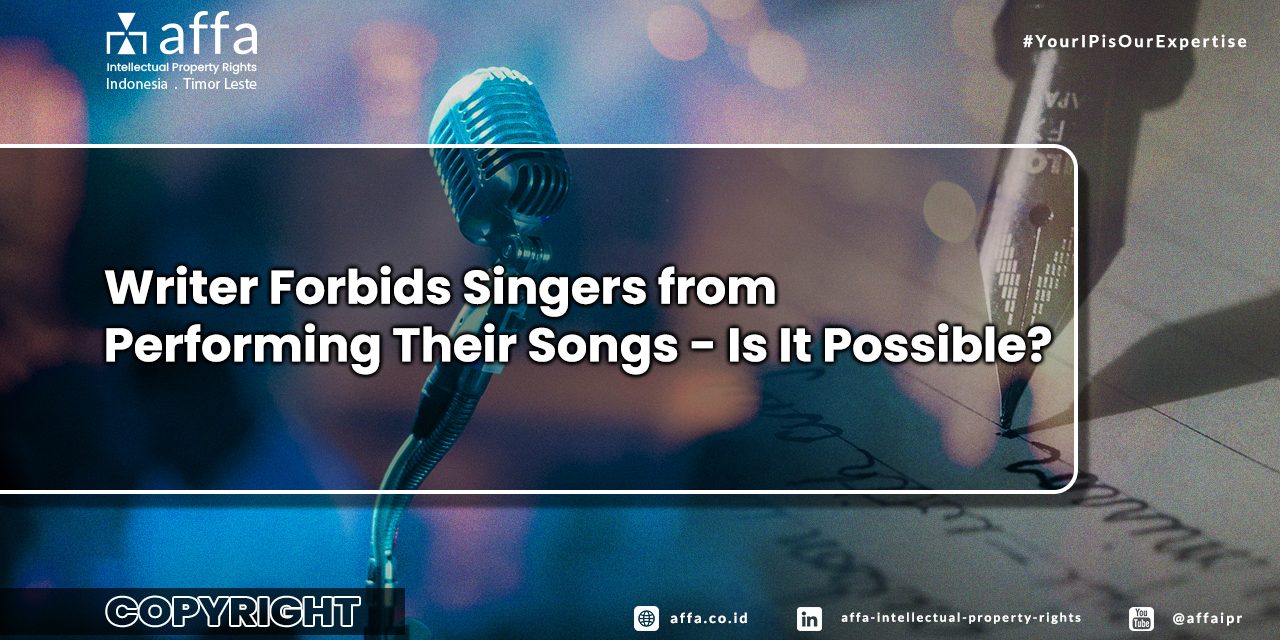Writer Forbids Singers from Performing Their Songs – Is It Possible?
A few weeks ago, the Indonesian music industry was enlivened by the case of a 35 billion Rupiah lawsuit from Ndhank Surahman Hartono, former guitarist and composer of the song “Mungkinkah” (in English: “Is it possible?”), against the band Stinky, where he used to belong. Apart from prohibiting Stinky from performing the song he wrote, Ndhank also prohibited Stinky’s former vocalist, Andre Taulany, later known as a comedian, from performing the song at any opportunity.
However, two weeks later, Ndhank withdrew his lawsuit after Andre and his colleagues took a family approach. Ndhank even broke off cooperation with the lawyer who had previously directed him to file a lawsuit. Stinky revealed that the song was not created by Ndhank alone but was created with Irwan Batara, a bass player who is still active with Stinky and can be proven by a recordation certificate at the Directorate General of Intellectual Property (DGIP), complete with royalties that have been given regularly through the Collective Management Organization (LMK), namely Yayasan Karya Cipta Indonesia (YKCI) and Wahana Musik Indonesia (WAMI).
That demand arose because Ndhank was experiencing economic difficulties, even though he saw that his song was still popular and often performed. He then demanded to renegotiate the distribution of royalties for the song to 90:10 because Irwan Batara’s portion was only the lyrics at the end of the song. So, from an Intellectual Property perspective, does a songwriter have the right to prohibit other parties from performing their songs?
The Copyright Holder of A Song
Article 1 of Law of the Republic of Indonesia Number 28 of 2014 concerning Copyright states that a Creator is a person or several people who individually or together produce a Creation that is unique and personal in nature, and Article 40 states, “Songs and/or music with or without text” is a form of protected work.
Uniquely, in a song, the holder of Exclusive Rights (Moral and Economic) is not only the Creator as the Copyright Holder but also musicians, original singers as performers, and song producers who are also considered recipients of Related Rights. So, if a song generates royalties, those entitled to receive them are the creator and all parties listed as recipients of Related Rights.
Then, Article 70 of the Copyright Law, which explains Article 40, states that a song is a complete creative work. So it will be difficult for the Creator to claim a 90% share of royalties from a song, as in Ndhank’s demands, without mutual agreement from the other Creator, in this case, Irwan Batara, as well as the recipients of Related Rights, including Andre, the vocalist who popularized the song.
Legal Basis for the Creator to Prohibition
Because the original singer who first popularized a song is the recipient of the Related Rights, Article 13 of the Copyright Law also states that if the singer performs in a public performance, it is not considered a violation of Copyright. Unless otherwise indicated or approved by the Performer or the holder of the rights to the performance before or during the performance. So, in the case of the song “Mungkinkah,” what Andre did was not a copyright violation.
However, the case is different if the person banned is not the original singer, as was done by Ahmad Dhani, the creator of the DEWA band’s songs, to Once Mekel, the former vocalist of the DEWA. Due to Once’s position as not being the original singer of all of DEWA’s songs, he is not the recipient of the Related Rights of all of DEWA’s songs. Hence, as Creator, Ahmad Dhani has the right to prohibit Once from performing his songs, including not including Once’s name as a royalty recipient.
Ideal Royalty Distribution
In particular, no legal regulations regulate what percentage must be received by a creator (songwriter), what percentage is for performers (singers), and what percentage is for music producers because it goes back to their agreement at the beginning. This is where the source of the problem usually arises. In many cases, we can see that the singer then earns a lot of income from the various performances he performs, both alone and with his band. Meanwhile, the part that the songwriter received is only known by himself and the record producer.
Suppose we refer to Spotify, a music platform with 8.8 million users in Indonesia. In that case, the distribution of royalties is wholly handed over to the record producer/label owner and then distributed to the Creator and all recipients of Related Rights. However, what needs to be remembered here is that royalties are obtained from performances delivered by singers or playback of their songs via the application and from commercial playback of songs by other parties, for example, in shopping centers, hotels, cafes, and karaoke rooms.
This is where Collective Management Organization (LMKN) plays a role; as regulated by Government Regulation Number 56 of 2021, LMKN is a government auxiliary institution tasked with collecting and distributing royalties as well as managing the interests of the Economic Rights of Creators and Owners of Related Rights in the field of songs and/or music. If LMKN had functioned optimally in carrying out its duties, popular songwriters would have been able to have a better economy, and cases like this would not need to happen.
Should you need further information about Royalty and Copyright or other Intellectual Property Management, please do not hesitate to contact us via [email protected].







